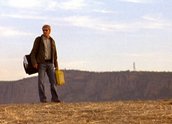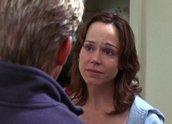


Three Dollars (2005)
Synopsis
Eddie Harnovey (David Wenham) gets the sack. His job as a chemical engineer for a government department is abolished after he refuses to rubber-stamp a large residential development on land contaminated with pesticide. Eddie contemplates his future as he remembers his past – the university days when he met the gorgeous and politically active Tanya (Frances O’Connor); his childhood, when he fell in love with Amanda, the neighbour whose father was a property developer; the optimism and excitement of young married life with Tanya, with whom he has a daughter Abbi (Johanna Hunt-Prokhovnik). Now approaching 40, Eddie’s life is about to unravel faster than he would have thought possible. On the way down, he still helps everyone he can; he has compulsive kindness. In a society going to the dogs, Eddie Harnovey’s problem is that he refuses to compromise, or look the other way.
Curator’s notes
Robert Connolly has directed only two films (as of 2007) but both have shown a strong political engagement. The Bank was an indictment of the brutal tactics of big business; Three Dollars is an indictment of the brutal realities of life. It’s a story of a good man brought to his knees by nothing special. Eddies loses his job, his wife is depressed, his kid has epilepsy. These are the kinds of problems that everyone in the audience may face in their lives, and that familiarity is part of what made the film connect with audiences. The key to the film’s success is partly David Wenham’s performance. He’s an expert at playing decent men, and Eddie’s decency is what makes him heroic. Down to his last three dollars, out of work and rushing to a job interview, an older woman falls on the footpath nearby. He picks her up, gets her aspirin, tears the suit he needs to wear to the job interview and doesn’t leave till he’s sure she’s alright. That scene is the film’s challenge to the audience: what would you do, it asks us. The film is based on a novel by Elliot Perlman, who co-wrote the script, but it’s also strongly inflected with Connolly’s political activism. He has said it was inspired partly by a banner that was draped on the Sydney Harbour Bridge, after a general election. It said: 'Australians have decided to live in an economy, and not a society’. 'That’s been a fascination of mine in the context of a world that’s rapidly shuffling into an economic imperative’, Connolly has said.
- Overview
- Curator’s notes
- Video 3 clips
- Principal credits
- Find a copy
- Make a comment
- Add your review



